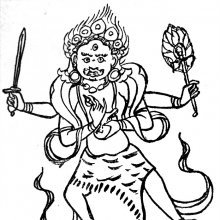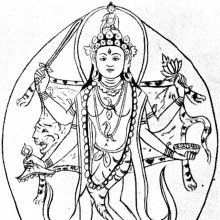Brahmananda, Brahmānanda, Brahman-ananda, Brahmanamda: 12 definitions
Introduction:
Brahmananda means something in Hinduism, Sanskrit, Marathi. If you want to know the exact meaning, history, etymology or English translation of this term then check out the descriptions on this page. Add your comment or reference to a book if you want to contribute to this summary article.
Images (photo gallery)
In Hinduism
Yoga (school of philosophy)
Source: Wisdom Library: YogaBrahmananda is one of the eighty-four Siddhas associated with eighty-four Yogic postures (āsanas), according to popular tradition in Jodhpur, Rājasthān. These posture-performing Siddhas are drawn from illustrative sources known as the Nava-nātha-caurāsī-siddha from Vȧrāṇasī and the Nava-nātha-caruāsī-siddha-bālāsundarī-yogamāyā from Puṇe. They bear some similarity between the eighty-four Siddhas painted on the walls of the sanctum of the temple in Mahāmandir.
The names of these Siddhas (e.g., Brahmananda) to 19th-century inscription on a painting from Jodhpur, which is labelled as “Maharaja Mansing and eighty-four Yogis”. The association of Siddhas with yogis reveals the tradition of seeing Matsyendra and his disciple Gorakṣa as the founders of haṭhayoga.
Source: ORA: Amanaska (king of all yogas): A Critical Edition and Annotated Translation by Jason BirchBrahmānanda (ब्रह्मानन्द) refers to the “bliss of Brahma”, according to the Haṭhapradīpikā of Svātmārāma: an influential 15th-century Sanskrit manual on Hatha-Yoga dealing with techniques to channel one’s vital energy.—Accordingly, “Now I shall talk about the best method of Samādhi, which prevents death; is an easy means [to success] and is the chief cause of the bliss of Brahma (brahmānanda)”.

Yoga is originally considered a branch of Hindu philosophy (astika), but both ancient and modern Yoga combine the physical, mental and spiritual. Yoga teaches various physical techniques also known as āsanas (postures), used for various purposes (eg., meditation, contemplation, relaxation).
Vaishnavism (Vaishava dharma)
Source: Pure Bhakti: Bhagavad-gita (4th edition)Brahmānanda (ब्रह्मानन्द) refers to “bliss experienced by one situated in brahma”. (cf. Glossary page from Śrīmad-Bhagavad-Gītā).
Source: Pure Bhakti: Brhad BhagavatamrtamBrahmānanda (ब्रह्मानन्द) refers to:—The bliss of one who is Brahman realized. (cf. Glossary page from Śrī Bṛhad-bhāgavatāmṛta).

Vaishnava (वैष्णव, vaiṣṇava) or vaishnavism (vaiṣṇavism) represents a tradition of Hinduism worshipping Vishnu as the supreme Lord. Similar to the Shaktism and Shaivism traditions, Vaishnavism also developed as an individual movement, famous for its exposition of the dashavatara (‘ten avatars of Vishnu’).
Languages of India and abroad
Marathi-English dictionary
Source: DDSA: The Molesworth Marathi and English Dictionarybrahmānanda (ब्रह्मानंद).—m (S) The bliss of brahma. 2 The bliss or joy subsisting in absorption into brahma 3 fig. Any great joy; any transport, rapture, or ecstasy. Ex. tyācē grantha pāhatāṃ viśēṣa || bra0 ucambaḷē ||.
Source: DDSA: The Aryabhusan school dictionary, Marathi-Englishbrahmānanda (ब्रह्मानंद).—m The bliss of bramha. Fig. Any great joy.
Marathi is an Indo-European language having over 70 million native speakers people in (predominantly) Maharashtra India. Marathi, like many other Indo-Aryan languages, evolved from early forms of Prakrit, which itself is a subset of Sanskrit, one of the most ancient languages of the world.
Sanskrit dictionary
Source: DDSA: The practical Sanskrit-English dictionaryBrahmānanda (ब्रह्मानन्द).—bliss or rapture of absorption into Brahma; ब्रह्मानन्दसाक्षात्क्रियां (brahmānandasākṣātkriyāṃ) Mv.7.31.
Derivable forms: brahmānandaḥ (ब्रह्मानन्दः).
Brahmānanda is a Sanskrit compound consisting of the terms brahman and ānanda (आनन्द).
Source: Cologne Digital Sanskrit Dictionaries: Aufrecht Catalogus Catalogorum1) Brahmānanda (ब्रह्मानन्द) as mentioned in Aufrecht’s Catalogus Catalogorum:—vedānta, by Ānandatīrtha. Sūcīpattra. 58.
2) Brahmānanda (ब्रह्मानन्द):—the third chapter of the Pañcadaśī. B. 4, 90.
—[commentary] by Rāmakṛṣṇa. Rice. 158.
3) Brahmānanda (ब्रह्मानन्द):—pupil of Meruśāstrin: Jyotsnā on the Haṭhapradīpikā. Tripurārcanarahasya. Bhāvārthadīpikā Ānandalaharīṭīkā. Śāktānandataraṅgiṇī. Ṣaṭcakradīpikā [tantric]
4) Brahmānanda (ब्रह्मानन्द):—Śivalīlāmṛta. P. 17.
5) Brahmānanda (ब्रह्मानन्द):—Tārārahasya [tantric]
Source: Cologne Digital Sanskrit Dictionaries: Monier-Williams Sanskrit-English Dictionary1) Brahmānanda (ब्रह्मानन्द):—[from brahma > brahman] m. ‘joy in Brahmă’, the rapture of absorption into the one self-existent Spirit, [Rāmatāpanīya-upaniṣad]
2) [v.s. ...] Name of various men and authors (also -giri m., -parama-haṃsa m., -bhāratī m., -yogin m., -yogīndra m., -sārasvatī m., and din, m.)
3) [v.s. ...] Name of [work]
[Sanskrit to German]
Sanskrit, also spelled संस्कृतम् (saṃskṛtam), is an ancient language of India commonly seen as the grandmother of the Indo-European language family (even English!). Closely allied with Prakrit and Pali, Sanskrit is more exhaustive in both grammar and terms and has the most extensive collection of literature in the world, greatly surpassing its sister-languages Greek and Latin.
Kannada-English dictionary
Source: Alar: Kannada-English corpusBrahmānaṃda (ಬ್ರಹ್ಮಾನಂದ):—
1) [noun] the rapture of absorption into the one self-existent Spirit.
2) [noun] the state of being in deep sleep; complete unconsciousness.
3) [noun] (fig.) a feeling of overpowering joy; great delight; ecstasy; rapture.
Kannada is a Dravidian language (as opposed to the Indo-European language family) mainly spoken in the southwestern region of India.
See also (Relevant definitions)
Partial matches: Brahman, Ananda.
Starts with: Brahmananda bharati, Brahmananda paramahamsa, Brahmananda sarasvati, Brahmananda yogin, Brahmananda yogindra, Brahmanandabharati, Brahmanandagiri, Brahmanandakara, Brahmanandana, Brahmanandanatha, Brahmanandaparamahamsa, Brahmanandasarasvati, Brahmanandastava, Brahmanandasutraktavali, Brahmanandasutramuktavali, Brahmanandavalli, Brahmanandavilasa, Brahmanandayogin, Brahmanandayogindra.
Ends with: Gaudabrahmananda.
Full-text (+109): Jyotsna, Brahmananda sarasvati, Brahmanandasarasvati, Brahmanandavalli, Brahmanandaparamahamsa, Brahmanandasutramuktavali, Brahmanandavilasa, Brahmanandastava, Brahmanandayogin, Brahmanandagiri, Brahmanandabharati, Brahmanandayogindra, Tararahasya, Brahmananda bharati, Shivalilamrita, Gaudabrahmananda, Brahmanandiya, Parabrahmanandabodha, Taraka brahmananda sarasvati, Vidyananda sarasvati.
Relevant text
Search found 44 books and stories containing Brahmananda, Brahmānanda, Brahman-ananda, Brahman-ānanda, Brahmanamda, Brahmānaṃda; (plurals include: Brahmanandas, Brahmānandas, anandas, ānandas, Brahmanamdas, Brahmānaṃdas). You can also click to the full overview containing English textual excerpts. Below are direct links for the most relevant articles:
Garga Samhita (English) (by Danavir Goswami)
Verse 6.18.22 < [Chapter 18 - In the Course of Describing the Glories of Siddhāśrama, a Description of the Rāsa-dance Festival]
Brihad Bhagavatamrita (commentary) (by Śrī Śrīmad Bhaktivedānta Nārāyana Gosvāmī Mahārāja)
Verse 1.3.51 < [Chapter 3 - Prapañcātīta (beyond the Material Plane)]
Verse 1.7.126 < [Chapter 7 - Pūrṇa (pinnacle of excellent devotees)]
Verse 2.3.130 < [Chapter 3 - Bhajana (loving service)]
Preceptors of Advaita (by T. M. P. Mahadevan)
Taittiriya Upanishad Bhashya Vartika (by R. Balasubramanian)
Verse 2.486 < [Book 2 - Brahmavallī]
Chaitanya Bhagavata (by Bhumipati Dāsa)
Verse 2.28.103-104 < [Chapter 28 - The Lord’s Pastime of Accepting Sannyāsa]
Verse 2.18.104 < [Chapter 18 - Mahāprabhu’s Dancing as a Gopī]
Verse 2.28.11-012 < [Chapter 28 - The Lord’s Pastime of Accepting Sannyāsa]

